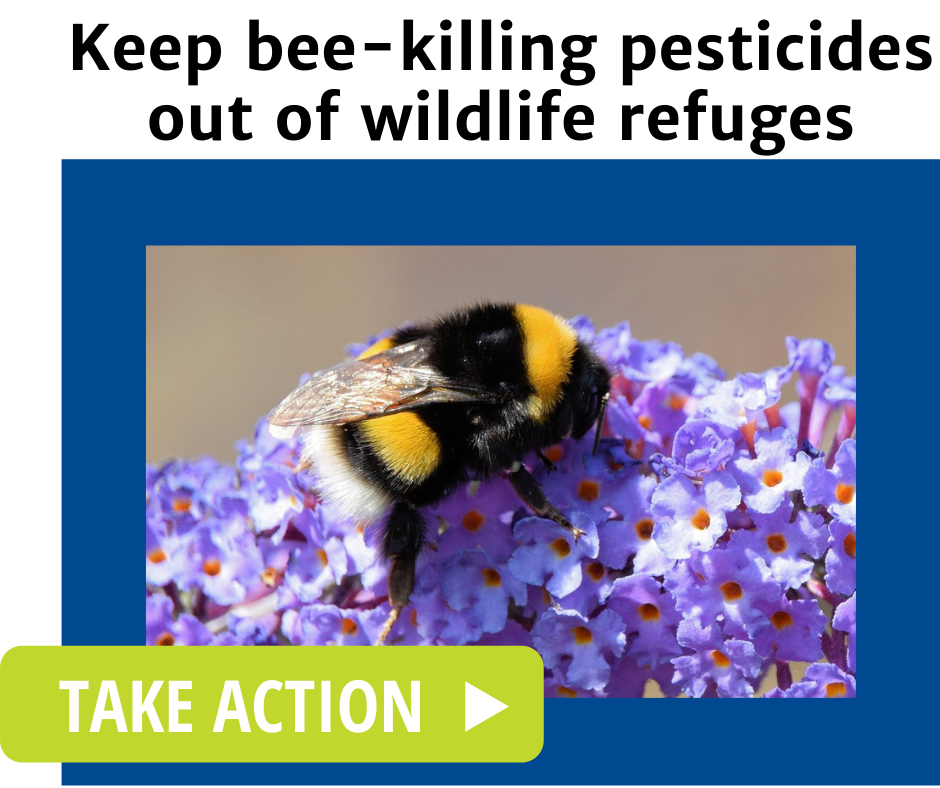

 |
Friend,
Bee-killing pesticides are everywhere: A study found neonicotinoids -- a dangerous class of pesticides -- on more than half of all sampled plants.1
And if there's one place where bees should be safe, it's wildlife refuges. Yet for the last three years, a Trump administration rollback has allowed neonicotinoids, or "neonics," in wildlife refuges.2
With bee populations hitting dire lows in recent years, we must work to protect bees where they should be safest. Friend, will you help us?
Tell the Biden administration: Keep bees safe in wildlife refuges.
Seven years ago, the Obama administration announced that bee-killing neonics would no longer be allowed in wildlife refuges.3 The result? Bees were free to roam the 95 million acres of protected lands without the threat of bee-killing pesticides. But the Trump administration reversed course.
When the Trump administration removed this critical protection, it put bees in harm's way. Neonics do more than damage bees' habitat -- they keep bees from sleeping, alter their feeding habits, and diminish their ability to reproduce.4
At Environment Colorado, we know the importance of bees. They're nature's best pollinators. That's why we're working to give bees a chance, but in order to do that, we have to protect them in their safe havens.
Help keep neonics out of wildlife refuges.
In recent years, beekeepers have seen some of the worst-ever die-offs.5,6 Neonics contributed to bee colony losses of more than 40 percent in 2019 alone.7
While research shows that wildlife refuges can protect bee populations, a wildlife refuge filled with neonics is no refuge at all.8
With a new administration in Washington, D.C., we're working to bring back the Obama-era ban that protected bees in wildlife refuges. Will you join us?
Tell the Biden administration: Give bees a chance.
Thank you,
Hannah Collazo
State Director
1. Staff, "Lowe's says it will cut out neonic pesticides -- by 2019," Concho Valley News, April 10, 2015.
2. "Trump administration lifts ban on pesticides linked to declining bee numbers," The Guardian, August 3, 2018.
3. "Trump administration lifts ban on pesticides linked to declining bee numbers," The Guardian, August 3, 2018.
4. Marissa Shapiro, "Honey bees lose sleep after ingesting pesticides, leading to greater stress and lower hive survival rates," Vanderbilt University, November 5, 2020.
5. University of Maryland, "US beekeepers reported lower winter losses but abnormally high summer losses," Science Daily, June 22, 2020.
6. University of Maryland, "U.S. beekeepers lost over 40 percent of colonies last year, highest winter losses ever recorded," Science Daily, June 19, 2019.
7. Dharna Noor, "A Record Number of Bees Died Last Summer," Gizmodo, June 22, 2020.
8. Ezra S. Auerbach, William P Johnson, Jude R Smith, Nancy E McIntyre, "Wildlife Refuges Support High Bee Diversity on the Southern Great Plains," Oxford Academic, May 22, 2019.
Donate today. A cleaner, greener future is within our reach. Your donation today can help us bring the vision we share a little closer to reality.
Environment Colorado, Inc.
1543 Wazee St., Suite 400, Denver, CO 80202, (303) 573-3871
Member questions or requests call 1-800-401-6511.
Facebook | Twitter
If you want us to stop sending you e-mail then follow this link -- Unsubscribe